Piter Py # 3 - Personal Impressions
Last weekend, the third Pitonist conference in St. Petersburg was held - Piter Py # 3 ( http://it-sobytie.ru/events/5862 ).
The conference lasted three days, was half English, all these days the words "Docker", "Mongo", "Ansible" were pronounced even more often than "Python". And here I first heard about the existence of YAML programmers.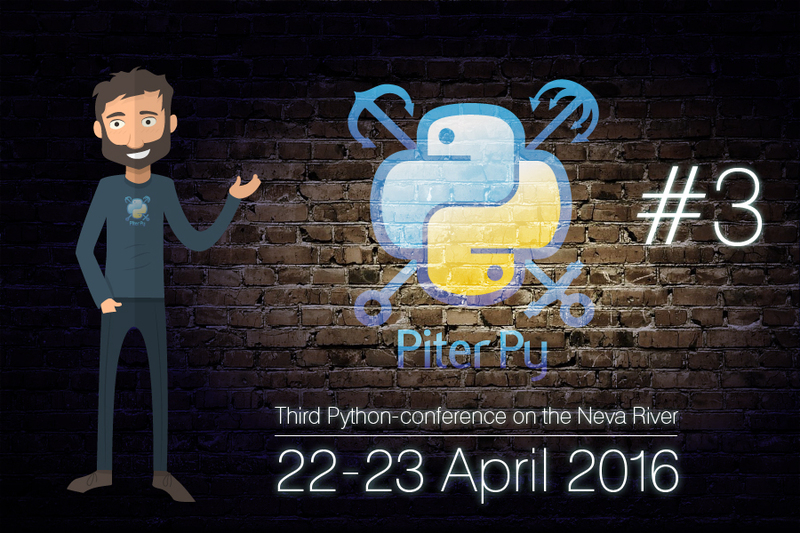
I share my own impressions and, I believe, I express the opinion of most other visitors.
UPD Added inside the post pictures ~ 4 MB.
First of all, I was pleased with the systematic approach of the organizers, in his opening remarks, Gregory said that we would not be taught here, we are all old enough to look at the Internet on our own, read a book, but gathered here to to give a talk discuss trends in the modern world of technology development.
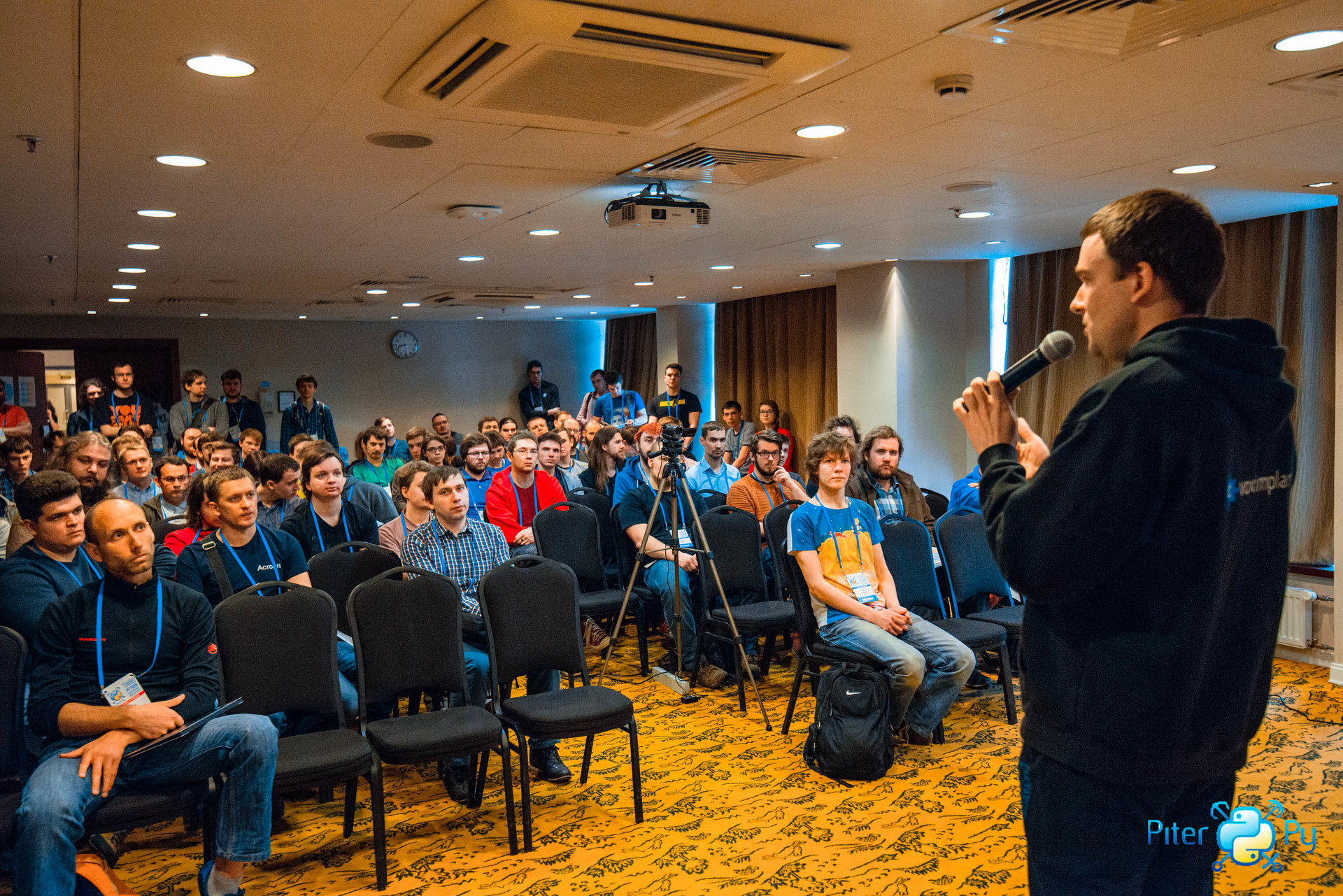
As for the reports themselves, I would like to note the following:
“Docker master class for python developers” - Ilya showed you live how to work with docker, docker-compose, docker-machine. It is expected that nothing fundamentally new was heard, but I discovered a number of new things. From my point of view it was the most driving of the reports.
“DSL in Python. How and why? ”- I personally oppose the development of DSL for everybody, about which I did not miss the opportunity to speak (what contributed to the achievement of the conference goals). However, the taste and color of all markers are different, and no one has repealed the law that every self-respecting programmer must develop his own programming language, Ivan reveals how to do this. Ironically, we will probably have to develop our own SQL for one of the products.
“Properly preparing API documentation in a Python project using RAML” is the best presentation of Russian speakers in English and one of the best at the conference. Well-structured, well-presented concept of the RESTful API development methodology, the authors even developed 9 questions, according to the answers to which one can judge the quality of your approach to API development. The only upset was that for the entire report did not see a single line of code.
“Plone 5, all the content for all the people, all the time” - Cris showed how to make presentations, the best report in English is for the presentation of the material. Not to say that Plone himself was inspired, mostly because he has to solve another class of problems.
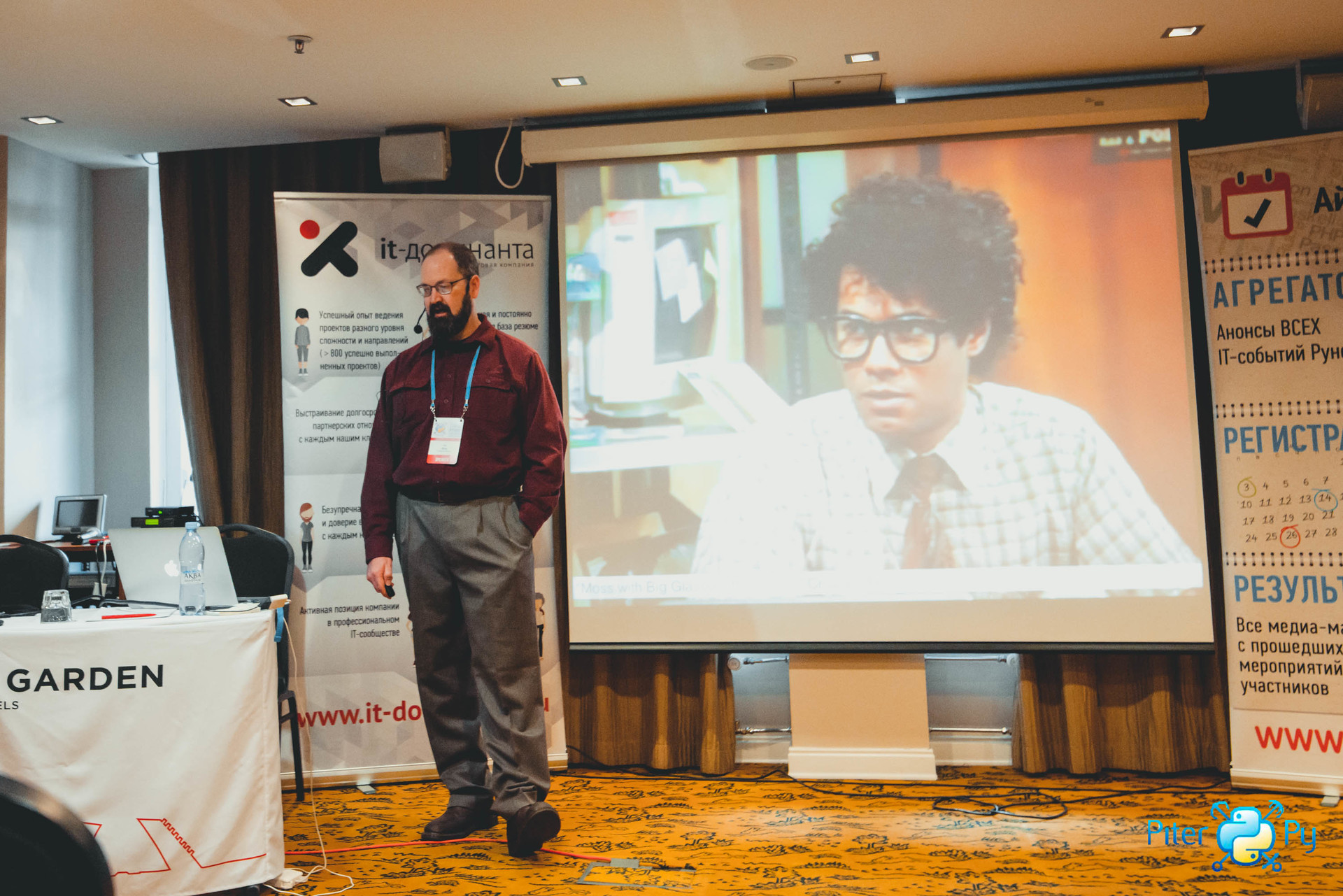
“Types: Python vs Typescript” - as one would expect, Gregory prepared an excellent report in which he reported on the trend of strengthening dynamic languages with static data types (it sounds scary, but could not formulate better). Related tools in Python vs Typescript, methods and implementation / migration difficulties were considered. And of course, Gregory did not forget to remind once again about Miller’s wallet .
“Django Channels: getting ready for an asynchronous future!” - a report about a bright future in Django, when principle 1 HttpRequest → 1 HttpResponse dies, celery will not be needed, Tornado too. Even now, the toolkit can be tried in django-channels. The report caused a lengthy discussion on the topic “is it correct to write while True:”, and, as it happens, everyone was against “while True”, which did not prevent the discussion from continuing. In fact, a reasonable question was raised from the audience, that without a developed infrastructure, it would be difficult to develop something that is supported, however, who prevents to start developing this infrastructure. There was no boring exactly on this report.
Two reports that I did not go to, but I heard very good reviews from visitors:
- Using GraphQL + Python to develop web applications
- Eve - REST API for Humans
now waiting for the video to watch.
As stated in the objectives, most of the conference was over coffee in the breaks and not coffee in the evenings.
Briefly, the discussion topics were:
- docker - cool, already in production,
- aiohttp is already in production,
- python 3, but 2 is still alive,
- ansilble - cool
- docker - cool, but not yet tried,
- chef and puppets are not cool, saltstack - xs,
- angular - dead, react - not very cool, but using,
- nginx - cool, apache stuck to someone,
- mongoDB - cool
- docker - cool
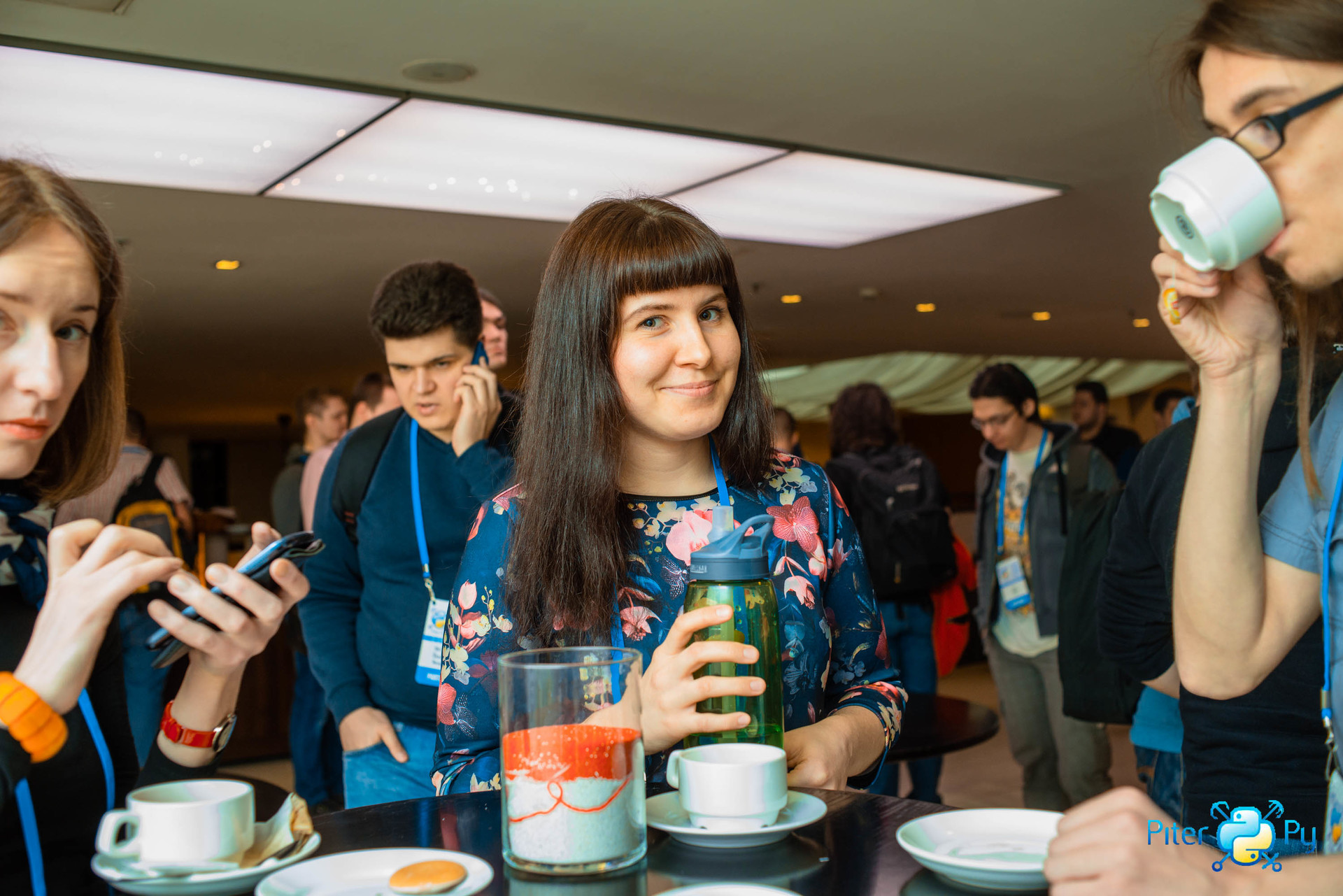
By evening, discussions flowed into the bar, became more international, the topics expanded, affecting everything from bikes to tractors. I left relatively early, but they say that evening meetings lasted, to put it mildly, until late at night.
I must say, I did not really believe in the idea of a partially English-language conference, I thought that the majority would be embarrassed to speak. But it turned out that there were quite a lot of people able to express themselves, and interest in the subject of conversation forced them to break the language barrier. Just imagine that someone is unreasonably bad about your favorite technology, isn’t bad knowledge of the language going to stop you ?! Of course, there was a lot of "let me speak from my heart", he was like that, but nobody was scolded for it. Now I am sure that the idea of making the next conference completely English-speaking is quite consistent.
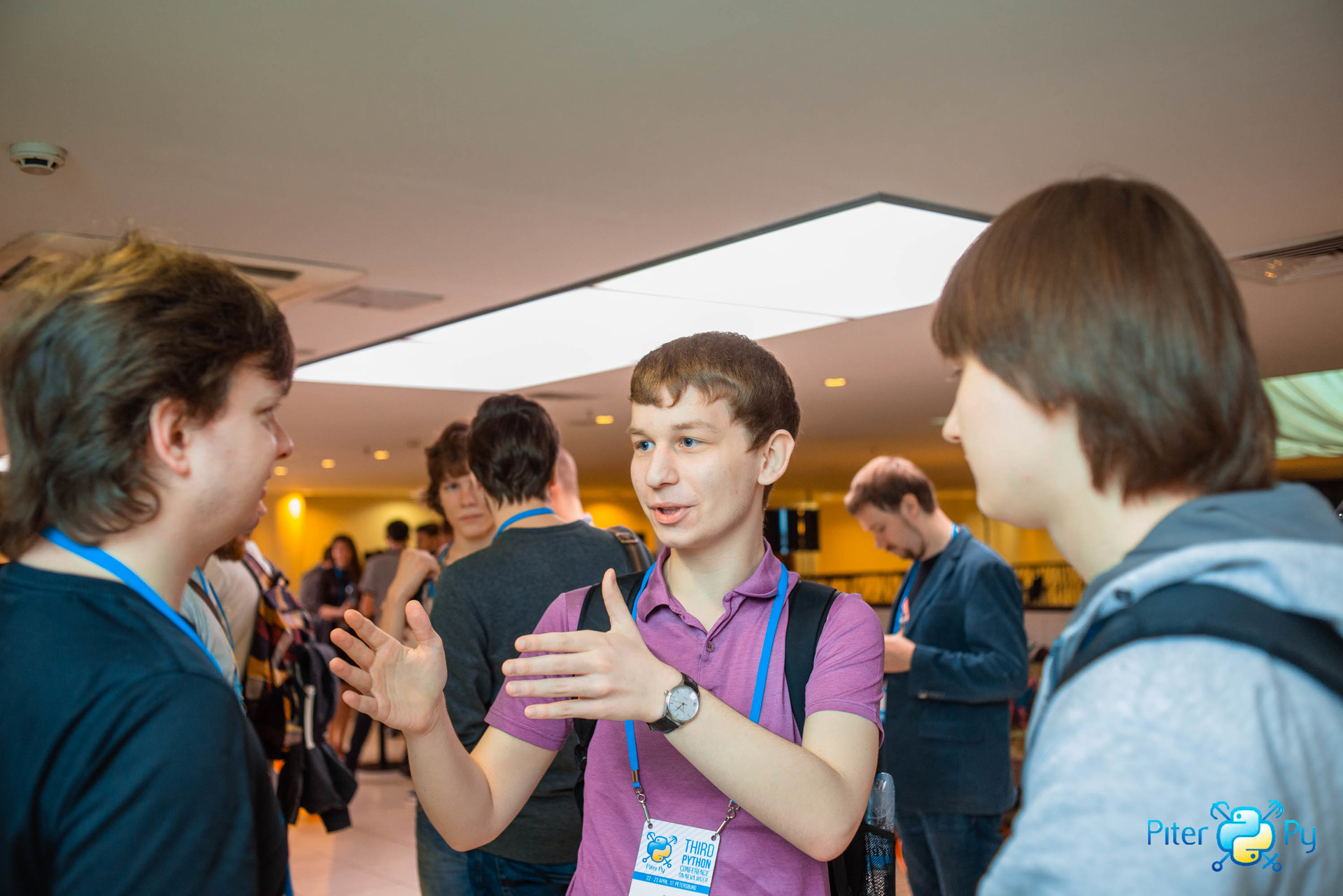
From the international discussion, I remember most of all the story of Simone, who, ironically, was hired by Microsoft because of his good knowledge of linux systems.
The conference ended with traditional bathing in fountains in the park of the 300th anniversary of St. Petersburg. In fact, it seems to be a tradition of some other community, and I did not see it, only rumors reach it.
It was the third day, with a cultural program, a visit to Pushkin, the Catherine Palace, a discussion of quadcopters, the uniqueness of GUIDs, approaches to the construction and disposal of objects in the country. In the same place, I came under the continued influence of a Haskell programmer who uses Haskell in web development, and now I cannot resist the steady desire to learn Haskell, I hope to overcome the designated high entry threshold during the May holidays, while reading the book and understand only that the threshold is really tall.
In conclusion, I will say that I want to participate in the next PiterPy conference, regardless of whether it is in English or not, and what reports will be announced. It will just be interesting for me to talk with these people and others like that, for sure they will convince me to look at some things in a new way, make them learn something else, is that how we become better?
')
Source: https://habr.com/ru/post/282656/
All Articles